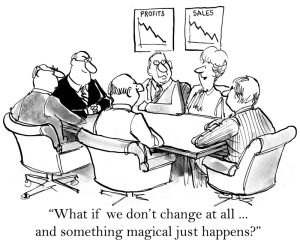As Farmers Insurance says it, ‘we know a thing or two, because we’ve seen a thing or two’.
While we at ECS can’t tell you much about how to handle a tree branch falling on your car, we can give solid insight into your CRM (customer relationship management) system. And we’d like to share with you some of good things we see – plus some of the crazy situations we have come across – when working with teams to document their process and then implement the CRM software.
The biggest mistake we see today beings with the selection of the CRM system. The problem occurs when a company makes the decision primarily based on the features available that are especially designed for their industry. We’ve heard things like: “We’re going to go with Billy Bob’s CRM as our provider, as their CRM’s got features designed specifically around moonshine sales”.
It may or may not surprise you to hear that these companies looking for industry-specific features reach out to us six months later and admit that their new CRM is a complete failure. We often then learn that the decision-makers for these companies have made the blanket judgement and decision, based on their exceedingly frustrating experience, that CRMs aren’t worth the effort to put into place. (We then talk them off of this ledge and guide them down a much better path).
This is not how the CRM selection and implementation process should go. And it really does horrify us to hear these stories.
A good CRM will act as the foundation of your customer interaction and journey. It is crucial to start with a complete understanding of your sales process, as you will then create a customized system that is designed specifically for you and will give you the results you desire.
As I mentioned before, we at ECS have seen it all when it comes to CRM selection and implementation. We share our insight and offer five key points to remember when developing your process in order to develop your new CRM:
- Get everyone involved in building process: Look at your customer journey and determine which departments touch customers along the way. We often have operations, customer service, finance and distribution in the room as our team works with clients to document (and sometimes create, if it doesn’t really exist) the process.
- Discuss, agree and write it down. Over half of our engagements tell us they have a documented process within their company that everyone knows. Is there truth to this? As we start to dig in with the client team, we often find out – it usually just takes minutes! – that there is disagreement of what’s actually happening in each step and who should be involved. Our advice: take your time and get agreement every step of the way from the entire team.
- Be clear on what’s happening from step to step. Don’t be vague of what triggers a move to the next step. If you aren’t clear in the development and documentation of the process, it certainly won’t be clear to your team later on. Address this head-on now.
- Identify your key metrics and data points. Not everything needs to be recorded in your CRM. Decide what data is important data to have in order to support your business growth. Develop and design those data field around your needs in the process. If the data isn’t important to you, then let it go.
- Determine features you need for support. Once you have built the process, then look at the features you’ll need to support it. Does it make sense for you to have full email integration? Should you have some automated functionality built in (or a lot – or is none actually needed)? What kind of dashboard capabilities will you need? These are just some of the important questions to ask, once you have the process complete and documented.
Remember, CRMs fail because people don’t use them. It doesn’t matter how cool the feature is within a CRM – if it doesn’t match your process and make the sales process better and easy for everyone involved – they simply won’t adopt it. However, if you build a great process and then integrate and incorporate the proper features, you’ll have a great system that will help your sales team be more efficient and effective, and will bring your company better results.
Want to talk to ECS about your CRM? Or talk about your lack of one, or your need to make sure your CRM really does what it needs to do for your company? Don’t hold back any of your questions – we’d love to chat with you and find out more about the challenges you face and the opportunities on your horizon.
Contact Margo Michel – mmichel@thinkempirical.com (or LinkIn with her here) and she’ll be happy to chat.



